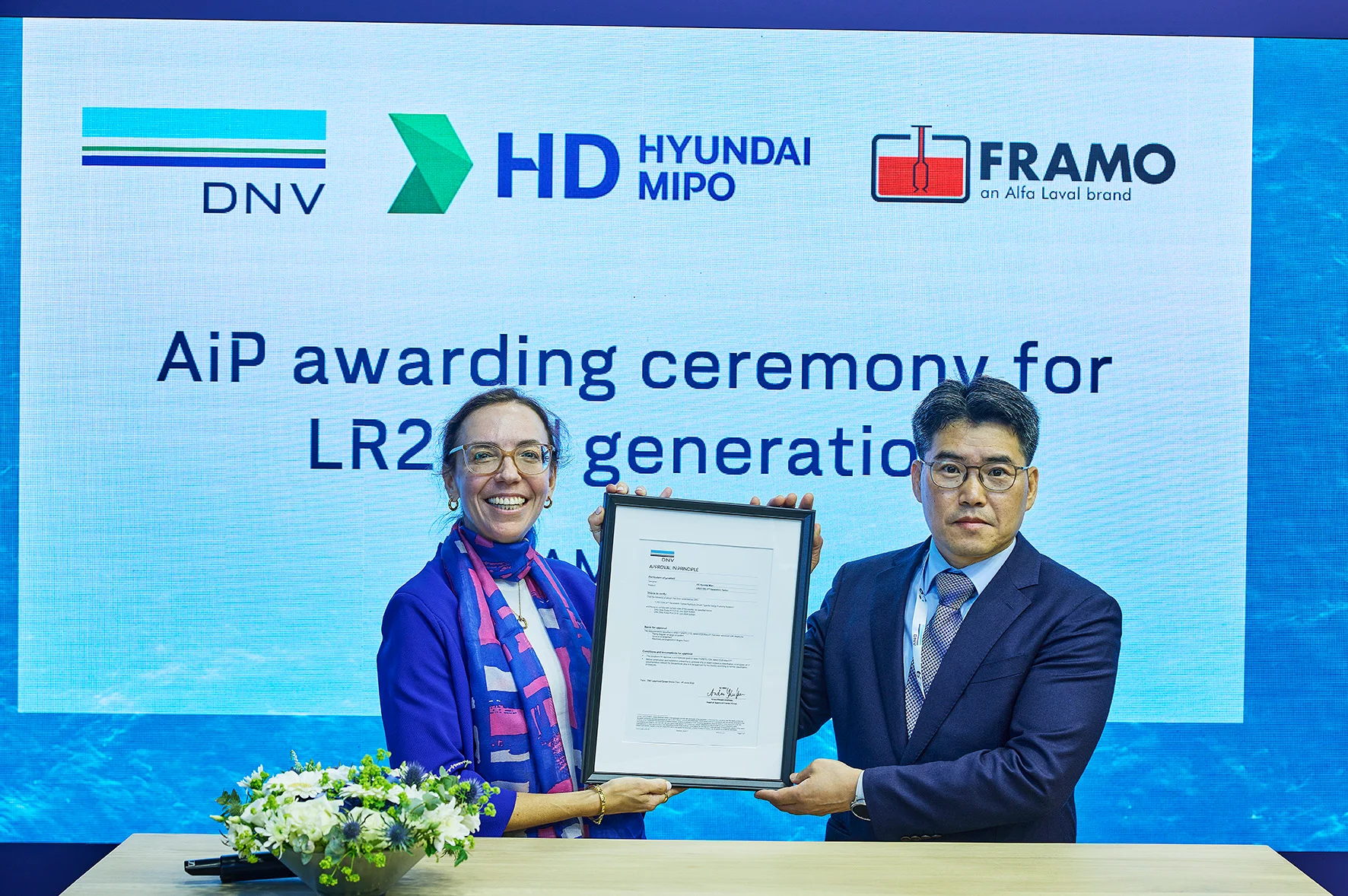Classification society DNV has awarded an Approval in Principle (AiP) to HD Hyundai Mipo for its 20,000 cbm liquefied carbon dioxide (LCO₂) carrier. This AiP is another milestone in the development of next-generation CO₂ transport solutions in this rapidly developing vessel segment.

As the first major projects in the global carbon capture, utilization and storage (CCUS) sector start to come on-line, shipping is stepping up to support this emerging industry. An innovative new 20K-class LCO₂ carrier design has been developed in close cooperation between HD Hyundai Mipo and DNV and is now recognized through the award of an Approval in Principle (AiP) at the Nor-Shipping trade fair.
The optimized design has been tailored to meet the increasing demand for efficient and secure transport of CO₂ for decarbonization projects worldwide. It addresses the specific challenges to CO₂ transport, including the high internal pressure, low-temperature conditions, and long-distance transport requirements. The AiP covers HD Hyundai Mipo’s optimized medium-pressure, type C cargo tank design, with structural safety verification for the complete vessel now finalized.
Dongjin Lee, EVP/Head of the Initial Design Div. & Detailed Design Div. at HD Hyundai Mipo, said: “This 20K LCO₂ carrier design offers a safe, practical solution for the expanding carbon transport market, and we are confident it will play a key role in global decarbonization efforts.”
Vidar Dolonen, Regional Manager of DNV Korea & Japan added: “This project is a successful example of global collaboration, drawing the deep technical competence and commitment to innovation between two leaders in their fields. By bringing together HD Hyundai Mipo’s technological excellence and DNV’s regulatory expertise, we are working to offer this exciting new industry a solution that can support the deployment and scaling of CCUS infrastructure and the global energy transition.”
Besides, DNV has also awarded an AiP to HD Hyundai Mipo for a new second-generation LR2 tanker design featuring a hydraulically driven cargo pumping system from Framo. The new design has the potential to significantly enhance safety, cargo handling performance, and energy efficiency.

The key feature of the new design is the elimination of the traditional pump room. This not only increases cargo capacity, but also removes a hazardous area, with the goal of significantly enhancing the overall safety of both the vessel and its crew. Other design features include: a simplified cargo piping system with all valves and pipes located on deck, eliminating piping penetrations between segregations as well as the use of one submerged pump per tank for complete cargo segregation, minimizing the risk of contamination. All together these features are tailored to enable faster, more efficient cargo operations, with reduced turnaround time, and increased vessel utilization.
The vessel is also equipped with deck-mounted cargo heaters, removing the need for in-tank heating coils. This is designed to minimize slop generation and allow for quicker, more effective tank cleaning, again with the goal of reducing downtime and improving operational efficiency.
Dongjin Lee, EVP/Head of Initial Design Div. & Detailed Design Div., at HD Hyundai Mipo, said: “ Through this collaboration with DNV and Framo, we have developed a design that not only enhances safety and efficiency but also offers tangible environmental benefits. Depending on the operational profile, we calculate that this design could reduce fuel consumption by up to 800 MT annually – contributing directly to lower emissions and improved sustainability for our customers.”
Cristina Saenz de Santa Maria, Chief Operating Officer, DNV Maritime, added: “ This second-generation LR2 tanker design is a great example of how close collaboration can lead to improvements in both performance and sustainability. With this AiP, they also show that they are putting safety at the forefront of innovation, by building on the basis of the world’s most advanced classification standards.”


